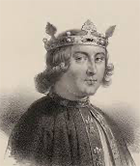The reign of King Philip V began on Nov. 20, 1316. He gained the support of his uncle and predecessor's advisor Charles of Valois and a handful of other nobles and had himself crowned in January 1317. Others in the kingdom wanted Louis' daughter, Joan, to succeed her father on the throne. In fact, many nobles refused to attend Philip's coronation. However, Philip had enough support to stay in power and, further, revived the Byzantine doctrine of Salic Law and applied it to prevent female succession to the throne.

His case for the kingship strengthened and his throne secure, Philip set about making administrative improvements. A pair of these were the standardization of weights and measures and the establishment of a single currency, both in aid of restoring some form of efficacy to the royal coffers, which had been drained by disputes internal and external. One of those continuing disputes was Flanders, which continued to assert its quasi-independence. Philip settled this conflict through a bit of deft diplomacy, just in time to confront a dispute with England's King Edward II. The English king was technically the ruler of Gascony and nominally supposed to be paying homage to the French king; Edward had not done so for a few years by the time that Philip took the throne. Philip managed to find a way through this predicament as well, getting Edward to pay homage but not fealty, a subtle difference that headed off another war. Closer to home, Philip set up a local militia system, with its officers answering to the king.
Philip V also had a hand in the selection of Pope John XXII, the second papal leader to rule from the French enclave of Avignon. King and pope colluded to rejuvenate the Crusader movement, with Philip himself pledging to lead a new army in a new holy war. That action never materialized. However, a second Shepherds' Crusade originated in Normandy in 1320. (The first had been an attempt to rescue King Louis IX, who had been captured in Egypt during the Seventh Crusade.) This new crusade had as its goal the "liberation" of the Iberian peninsula from Muslim influence but, instead, targeted Jews, royal officials, and priests in southern France and northern Spain.
Philip died suddenly on Jan. 3, 1322, the victim of dysentery. His younger brother became King Charles IV.
Next page > Charles IV > Page 1, 2, 3